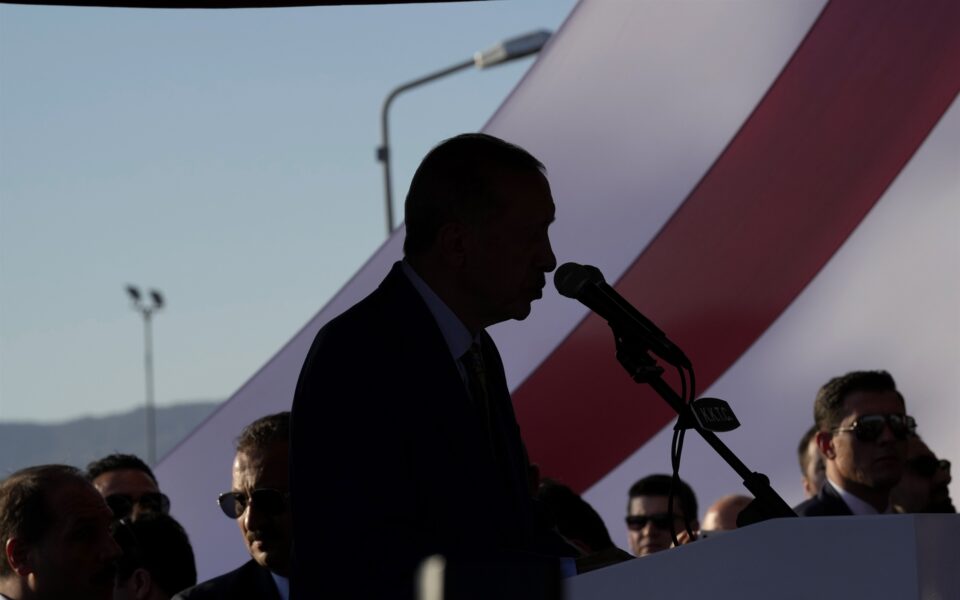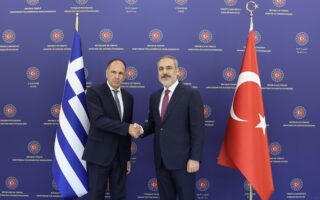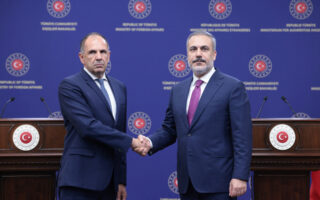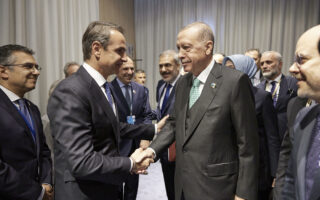Who benefits from Greek-Turkish relations deadlock?

In our previous article titled “Weighing the facts on the road to The Hague,” we attempted to assess the current circumstances and any prospects for progress in Greek-Turkish relations. Our analysis was based on three interconnected elements crucial to negotiations: the terms and framework within which they should occur, alternatives in the event of failure, and the timing and context of these negotiations. Naturally, all of this was considered in light of the existing balance of power, both in the present and the not-too-distant future. We briefly explored the alternatives in case a resolution to our dispute does not materialize through international justice (which is the most likely scenario under the current circumstances).
Our conclusion was that if even a faint prospect of resorting to The Hague or arbitration exists, Greek diplomacy should pursue it vigorously without relaxing its efforts to enhance and modernize its armed forces. After all, this has been a cornerstone of Greek foreign policy for half a century and should not be misconstrued as appeasement. Only those lacking knowledge of international affairs would perceive it as such.
The reactions were mixed, encompassing both positive and negative feedback. The majority of dissenting voices maintained a level of respect, although a few displayed a clear misunderstanding of the text, coupled with distortions of our arguments. In some cases, these critics resorted to ad hominem attacks and accusations that we were serving as forerunners to an already-decided “retreat.” So be it.
The internal discourse is only just beginning, and let’s hope it unfolds with terms that truly serve our national interests, meaning sincerity. However, it’s crucial to underscore two key points. The first one pertains to Turkey. What we aim to emphasize in our analysis is that the present situation is influenced by Turkey’s progress across various dimensions: political, social, economic, demographic, technological/industrial, and, certainly, its strategic ambition to establish itself as an independent and substantial regional and global player. Any examination of Greek-Turkish relations should commence from this standpoint. It’s a mistake to evaluate bilateral interactions based on the Turkey we wish to see, rather than the Turkey we are actually confronting.
Turkey’s stance
Over the past two decades, particularly since the failed coup in 2016, Ankara’s strategic choices have taken on a notably more confrontational and nationalist character, marked by clear neo-Ottoman and Islamic influences. This shift has rekindled discussions about Turkey’s relationship with the West. However, this debate rests on a flawed premise, assuming that Turkey was once a Western nation that has recently “strayed” due to its idiosyncratic president. In reality, Turkey has never been a true part of the West, even from a geopolitical perspective, except during the Cold War period. Its NATO membership was primarily driven by the threat posed by the USSR rather than shared ideological or geopolitical alignments.
The decreasing threat from the former USSR and the power vacuum resulting from the relative disengagement of the United States in the broader Middle East enabled Ankara to loosen its bonds with the West and pursue a path toward strategic autonomy. The deeply held belief within Ankara’s national security circles that the international system has shifted away from Western centrality and is evolving toward a post-Western order has also led to a resurgence of traditional fence-sitting.
However, both autonomy and balance have their limits. Turkey remains heavily reliant on the West in terms of economics, technology and politics, and its involvement in NATO places constraints on its strategic independence. The inherent contradiction for Ankara lies in its inability to achieve complete strategic autonomy while maintaining its membership in the Alliance, and currently, it has no interest in leaving. NATO is significant to Turkey not only because it exerts coercive influence on decision-making, but also because, if it were outside the Alliance, Turkey would find itself in a state of constant confrontation with it.
This strategic paradox also places restrictions on Turkey’s assertiveness toward our country, as we are formally considered “allies.” To overcome these constraints, Turkey employs coercive diplomacy whenever possible, pressuring us and attempting to provoke Greece into using violence first. This Turkish strategy escalated between 2019 and 2022. Now, following the Russian invasion of Ukraine, Turkey’s room to implement this coercive policy, though not eradicated, has considerably diminished. Nevertheless, this does not mean that Turkey has stopped exploiting its geopolitical position in pursuit of Western, particularly US, leniency. Its objective remains operating in a gray area, operating at or even beyond the bounds of international law. It is, to say the least, audacious for Turkey to accuse Greece of “violating the Treaty of Lausanne” in an attempt to portray Turkish aggression as “defense” and evade creating a fait accompli on our part.
It is noteworthy that even moderate Turkish observers attribute the signing of the illegal Turkey-Libya maritime boundaries agreement and the development of the Blue Homeland foreign policy dogma to their country’s response to perceived attempts to isolate it from Greece and Cyprus through trilateral schemes involving Israel and Egypt.
Similarly, the West’s stance toward Turkey appears to be inconsistent. Turkey is seen as both an intolerable and indispensable partner. However, within the context of Western interests, what matters most is preventing an intra-NATO conflict rather than resolving bilateral disputes. While the latter would be desirable, it is not deemed imperative as long as the situation remains manageable within certain limits. Consequently, Western restraint toward Turkey primarily focuses on conflict avoidance.
Greece’s stance
As long as Turkey refrains from crossing the “first-strike” threshold, it can actively pursue its revisionist agenda with relatively few consequences. Even in cases where it violated the territorial waters and the exclusive economic zone (EEZ) of Cyprus, an EU member-state, the sanctions imposed on Turkey were largely inconsequential.
The use of force or even specific unilateral actions on our part would lead to strategic isolation, the loss of our good reputation and, to some extent, legitimization of Turkish reactions
Greece, for its part, follows a strategic mix of internal (deterrence) and external (deterrence through alliances and partnerships) balancing. Especially regarding the second, our participation in NATO and the EU, the strategic agreements with France and the US, and the opening to countries with a wide reach, such as India, to a large extent strengthen us, but do not solve the issue of asserting and exercising our sovereign rights. Our alliances act as a balance against Turkish designs, but at the same time they bind us. Given the vital interests of the West in the region, the use of force or even specific unilateral actions on our part would lead to strategic isolation, loss of our good reputation and, to some extent, legitimization of Turkish reactions.
For the aforementioned reasons, the two countries have not clashed in the last 100 years, despite the fact that, since 1955, there have been many serious crises in bilateral relations. Both countries are trapped in a game of tension and zero-sum logic. Turkey has managed to impose a peculiar area denial, where Greece cannot fully exercise its sovereign rights in the Aegean and Eastern Mediterranean, while more and more aspects of its sovereignty are systematically questioned. We, on the other hand, can neither agree to the conditions set by Turkey, nor overcome the impasse through a conflict, unless of course we need to defend our territorial integrity. So what are the options?
Examining different options
And here we come to the second point. In general, there are no comprehensive alternative proposals that would actually improve our position in relation to Turkey. Weapon procurement works as a deterrent and certainly strengthens us in negotiations, but it does not produce solutions. As long as they are not combined with the development of a domestic defense industry (from 1974 to 2010 we spent 218 billion euros on the procurement of weapons) they work for the limited lifetime of the systems, at the expense, however, of the other important parameter of power, which is the economy, and without the benefit of adopting a model to gradually limit our technological/defense dependence.
The war in Ukraine, moreover, demonstrated that when the domestic defense industry does not cover operational needs, the dependence on third countries becomes almost absolute.
A common component of several of the alternative “proposals” is that they reproduce inaction, without a realistic strategic goal, under the pretext of Turkish intransigence. However, as long as the issues are not resolved – obviously in a sustainable way and in accordance with the national interests – we remain trapped at 6 nautical miles of territorial waters. We cannot delimit our continental shelf, we cannot exercise sovereign rights, and we do not safeguard them either. In addition to what we mentioned in our previous article, inaction makes it easier for Ankara to maintain a state of disputed sovereignty in areas of vital interest to us. And if we are being accused of utopian expectations, what should one describe the expectation that at some point in the future things will change, Turkey will change and the problems will be solved in a magical way?
There’s something else, too. Some believe that the easiest way, and a way to receive immediate media visibility and popularity, is the adoption of the so-called “hard” line on national issues. Their contribution to the public debate, beyond denouncing and demonizing the opposing point of view, consists of promoting proposals that are unknowingly (or, worse, knowingly) either utopian or dangerously harmful to our country.
The problem is not that they inflate minds and satisfy public opinion with platitudes and maximalist views, but that they create illusions and cultivate the belief that the solution is simple and what is missing is determination and boldness. However, if there were simple solutions someone would have found them 50 years ago. It’s not that no one thought of them, it’s that some ideas that have prevailed in the public debate cannot implemented or do not solve the problem.
In most scenarios, after a serious crisis or even a conflict, the most likely outcome is to be driven straight to the negotiating table. Those who favor actions of dubious international legitimacy or without broad international support are prescribing – without realizing it – a line of actions and reactions at the end of which is the negotiating table (which they deplore) but with much worse terms. Additionally, our actions should be operationally supportable so as not to enable Turkey to reverse them. We should remember that the two times the crisis was militarized, in 1987 and 1996, we ended up first in Davos (and the reaffirmation of the Bern Agreement of 1976), and then with the 1997 Madrid Declaration.
On the other hand, there are actions such as the gradual expansion of our territorial waters up to 12 nautical miles, and not to the same extent in all parts of the territory, which if done at the right time, would have already extended our sovereignty, strengthening our bargaining position.
We could cite a multitude of reasons why we should avoid dialogue and negotiation with Ankara. We know Turkey well: its mentality, its revisionism and its illegal actions, which we have highlighted with arguments in various fora, mainly abroad. However, after a lot of study, thinking, international contacts, conferences and the experiences we have gained, we have come to the conclusion that the current situation is a dead end, it does not benefit us, it does not guarantee our rights and the future is not predicted to be better than the present. Because it is our belief that as long as the present situation is maintained, Turkey not only does not lose anything, but it also takes advantage of the anarchic international environment and the regional changes to impose, on the one hand, a suffocating condition of increasing claims, and on the other an erosion of our sovereignty and usurpation of our sovereign rights. This situation does not concern and ultimately does not interest any third party. And no third party will do the slightest thing to change it. This is our national interest and strategic duty.
Alexandros Diakopoulos is a former national security adviser to the Greek prime minister, a retired vice admiral of the Hellenic Navy and a consultant at the Hellenic Foundation for European and Foreign Policy (ELIAMEP). Petros Liakouras is a professor of international law and director of the International and European Studies postgraduate program at the University of Piraeus. Κostas Ifantis is professor of international relations at Panteion University and director of the Institute of International Relations. Constantinos Filis is the director of the Institute of Global Affairs and an associate professor at the American College of Greece.





